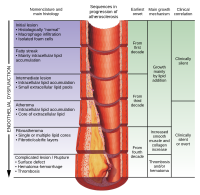
Photo from wikipedia
Oxidative stress induces the formation of oxidized low-density lipoprotein (ox-LDL), which accelerates the development of atherosclerosis and the rupture of atherosclerotic plaques by promoting lipid accumulation and inhibiting autophagy in… Click to show full abstract
Oxidative stress induces the formation of oxidized low-density lipoprotein (ox-LDL), which accelerates the development of atherosclerosis and the rupture of atherosclerotic plaques by promoting lipid accumulation and inhibiting autophagy in vascular cells. Lipophagy is known to be involved in maintaining the balance of neutral lipid metabolism; however, the phenomenon of lipophagy deficiency in ox-LDL-treated endothelial cells (ECs) remains to be elucidated. It has been demonstrated that lipid accumulation caused by ox-LDL inhibits autophagy, which promotes apoptosis in ECs. The aim of the present study was to investigate the association between decreased autophagy and lipid accumulation in ECs treated with ox-LDL. Electron microscopy demonstrated that the formation of autolipophagosomes was decreased in ox-LDL-treated human umbilical vein ECs compared with that in the LDL-treated group and was accompanied by a decrease in the autophagy-associated proteins via western blotting analysis. Using laser focal colocalization detection, decreased lipid processing was observed in the lysosomes of ox-LDL-treated ECs, which indicated that lipophagy may be attenuated and subsequently result in lipid accumulation in ox-LDL-treated ECs.
Journal Title: Molecular Medicine Reports
Year Published: 2020
Link to full text (if available)
Share on Social Media: Sign Up to like & get
recommendations!